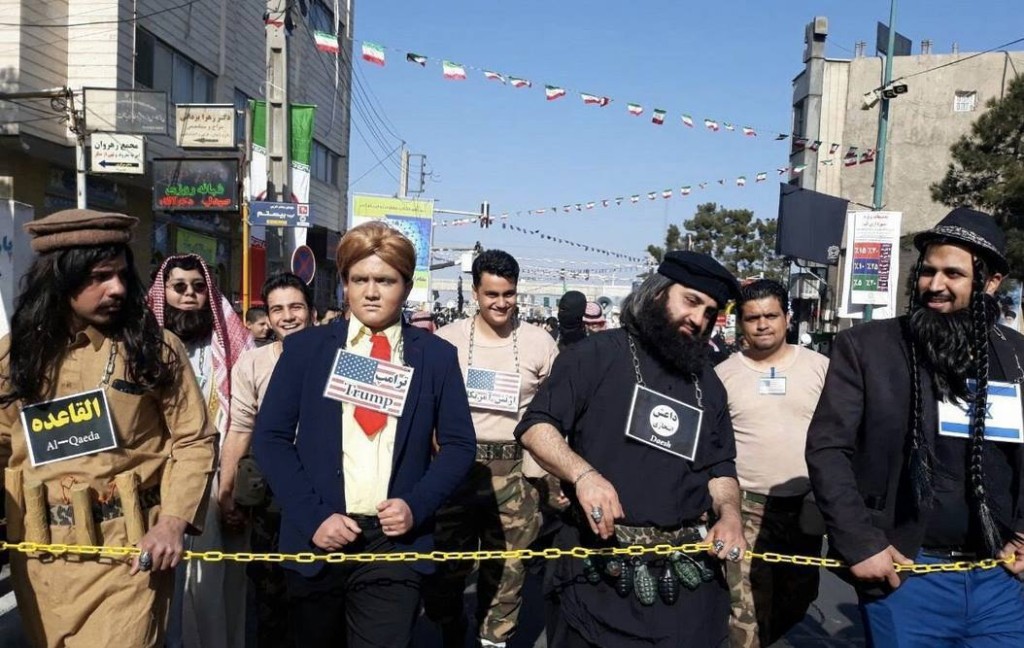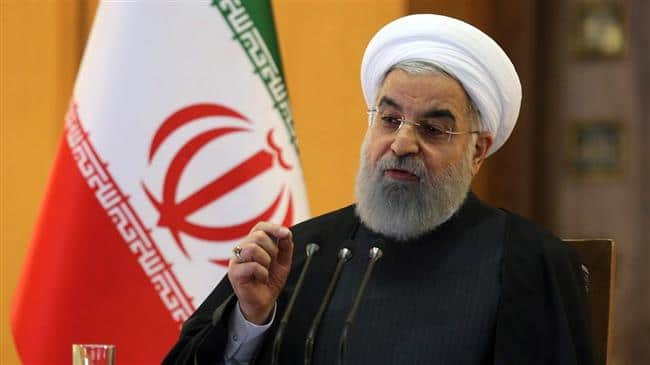Government concerned about effect on recovery of trade and investment limited by sanctions
LATEST
SUNDAY FEATURE
Iranian-Canadian Academic Dies in Tehran Prison Under Interrogation
UPDATE 1230 GMT: President Hassan Rouhani has addressed a crowd in Tehran’s Azadi Square on the 39th anniversary of the Islamic Revolution, calling for a “year of unity” amid recent protests and economic and political concerns.
Iranian State media, as usual, is proclaiming that “millions of Iranians” have rallied today while describing the protests of late December and early January as “scattered riots”. English-language Press TV also tries to portray “anger toward the US and its President”.
AP, Radio Free Europe, and Reuters describe “hundreds of thousands” of Iranians on the street today.
Rouhani appealed to the audience:
I request that the 40th year of the revolution, the coming year, be the year of unity. I ask principlists, reformists, moderates, and all parties and all people to come and be together….
When the revolution took place, we pushed some off the revolutionary train whom we shouldn’t have. Today, we have to let them board the train again.
The President defended the nuclear deal and Iran’s involvement in regional conflicts:
In the past year, we scored a victory over terrorism and had many achievements in routing terrorists and Daesh in the region. Our assistance to the people of Iraq and Syria came to fruition and the regional nations were saved from the scourge of terrorism.
He continued, “[The US and Israel] wanted to create tension in the region….They wanted to divide Iraq, Syria….They wanted to create long-term chaos in Lebanon…but with our help their policies failed.”
Marchers dress as the “international alliance against the Islamic Republic” — an Orthodox Jew, Donald Trump, an American soldier, an Al Qa’eda member, an ISIS fighter, and a Saudi prince:

Iranian President Hassan Rouhani said on Saturday that the US will make a “big strategic mistake” if it withdraws from the July 2015 agreement over Iran’s nuclear program.
Addressing ambassadors and heads of foreign organizations in Tehran, Rouhani asserted that the world would see an American departure from the deal as the “US’s biggest folly in its political relations with the world and particularly with our region”.
He repeated that the Islamic Republic has never violated its commitments under the Joint Comprehensive Plan of Action.
The Rouhani Government is concerned about existing and new US sanctions under the Trump Administration, threatening recovery necessary to bring Iran out of its economic difficulties of the last eight years. The restrictions are affecting Tehran’s ability to fulfil large trade and investment contracts with European companies, who could be punished by renewed US sanctions.
On Saturday, Rouhani appealed for foreign investment in Iran’s energy and petrochemical sectors.
Oil Minister Bijan Zanganeh said earlier this month that Iran is in discussion with 20 energy firms to bring in necessary technology for development of Iran’s oil and gas field, but that the negotiations are being limited by fear of US restrictions.
France’s energy giant Total, which agreed a $4.9 billion contract last July for a phase of Iran’s South Pars gas field, has said the deal is in jeopardy if there are new American sanctions.
Iran: No Talks Over Missiles
Meanwhile, the Supreme Leader’s top aide, Ali Akbar Velayati, maintained Iran’s line that it will not concede ground over its ballistic missile program.
The European signatories to the July 2015 agreement — Britain, France, and Germany — have maintained support for the nuclear deal. However, France and the European Union have called for a separate accord covering Iran’s testing and development of missiles.
The Islamic Republic has publicly rejected any discussion. Velayati said on Saturday, “The Islamic Republic of Iran will not seek anybody’s permission to develop its missile capabilities and will use missiles in any way and quantity it deems necessary, and this is a legitimate right of Iran.”
Revolutionary Guards “Consult” Reformists Over Recent Protests
The Intelligence Corps of the Revolutionary Guards have summoned reformists for discussions about the nationwide protests of late December and early January.
The reformists include some activists who were detained amid the mass protests after the disputed 2009 Presidential election. Some were called in groups, while others were summoned individually in Tehran. Academics with links to the Guards were present as “experts”.
A reformist said his interview was “friendly”, but others were threatened. One of the Guards was among interrogators in charge of questioning reformists in 2009.
The activist added that, while hoping to get information and analysis, “the Guards were adamant that the main instigators of recent protests were counter-revolutionary media that took advantage of people’s economic problems”.

